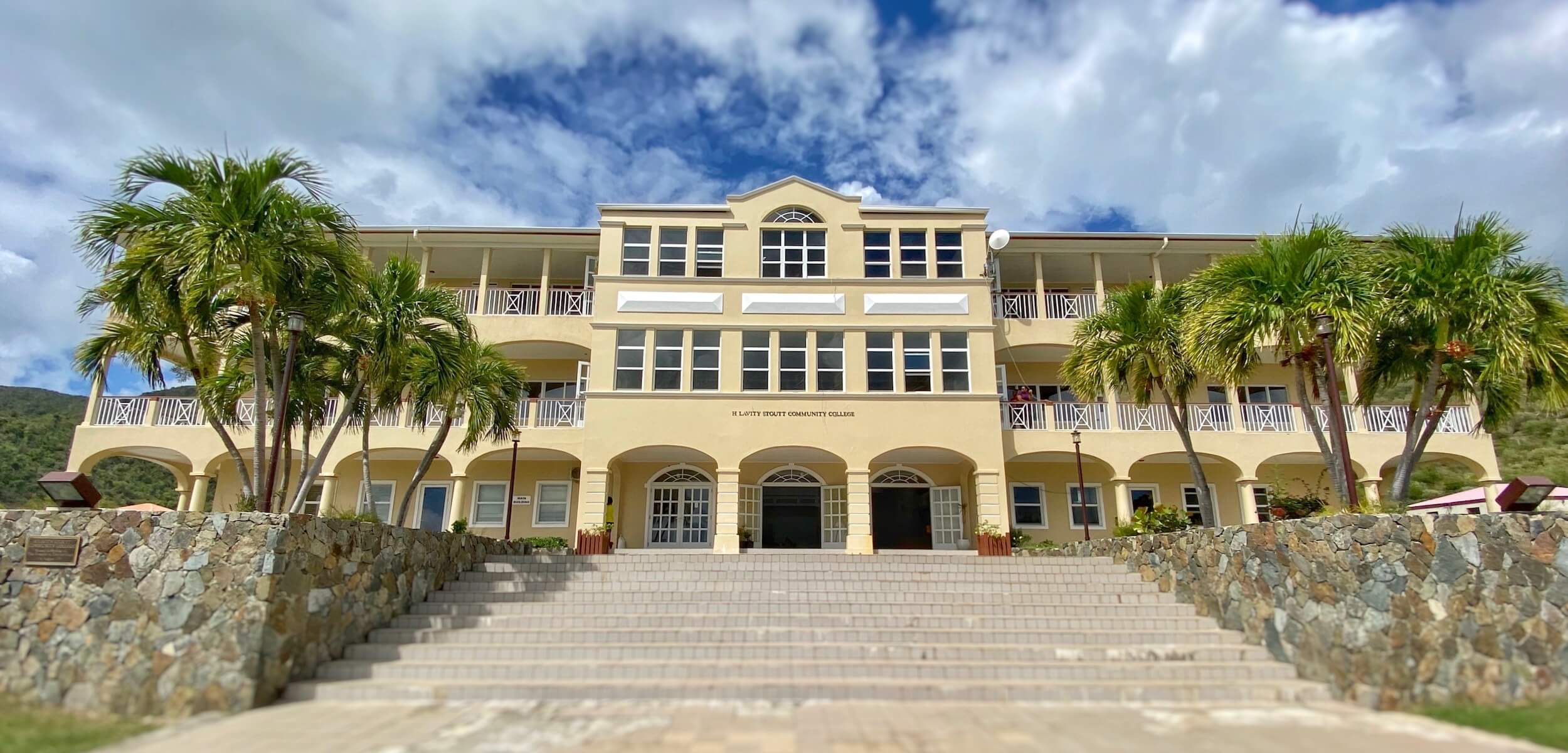History

Short History

Nearly four decades ago, in the early 1980s, the territory’s first Chief Minister, the late Hamilton Lavity Stoutt, proposed the idea of a community college. However, with a change in government in 1983, the project was temporarily put on hold.
When Stoutt returned to office three years later, the project was given new life. Soon, the intrepid Chief Minister appointed a programme committee made up of four task forces, with the overarching goal of defining what initial curriculum would be offered by the College.
A focus committee chaired by Dr. Norwell Harrigan was organised to gather feedback from the public on the viability of tertiary education in the Virgin Islands. Those discussions gave the green light for Eileene L. Parsons, OBE to be appointed in January 1989, to head the first College office in Road Town.
Just a few months later, on 10th March, the first Board of Governors for the College held an inaugural meeting and appointed an executive committee to manage the daily operations of the institution. The late Hamilton Lavity Stoutt was named the founding Chairman, while the late Ralph T. O’Neal, OBE served as the first Chairman.
Throughout 1989, a flurry of other groundwork for the College took place. In June, Dr. John Wallce, a private consultant and retired educator from Vermont who had also helped to set up the University of the Virgin Islands in St. Thomas, USVI, was hired as an interim Director to ensure that the College started on time. In July, organisers and volunteers gathered the results of college-related questionnaires that had been sent out to employers, employees, and the general public. Those responses showed an overwhelming need for classes in business and secretarial education, hospitality training, and personal development, which became some of the initial programmes offered by the College.
In November, Dr. Theodore Provo was appointed to serve as the first President of the College. By the end of the year, classroom space had been rented in the Omar Hodge building in Road Town, part-time instructors were appointed, and the College’s first courses were approved.
The British Virgin Islands Community College Act, passed in 1990, ushered in the formal legislative framework needed to open the institution. On January 14, the new college – then called the British Virgin Islands Community College – held its opening ceremony at the Omar Hodge building in Road Town. The next day, classes began for the first time—a total of 135 students enroled in 19 courses taught by residents. Through the coordinating efforts of Mrs. Hulda Grobman, classes had also been offered on the sister island of Virgin Gorda in 1990.
Three years after its opening, the College moved to a new, expansive campus in Paraquita Bay, where it still stands today. In 1993, the institution was also renamed in honour of its founding Chairman, H. Lavity Stoutt.
In 1996, the College established a dedicated presence that formally expanded its offerings to the Virgin Gorda community. At first, classes were held in the sister island’s Bregado Flax Educational Centre, and while most of the faculty were recruited from Virgin Gorda, some faculty commuted from Tortola to Virgin Gorda to provide instruction in various courses. The Virgin Gorda Centre officially opened in the Enid Pickering building that same year, providing a fixed home for the College’s second campus.
Timeline
A brief look at the important developments throughout the history of the H. Lavity Stoutt Community College:
- 1990 – On January 14, the British Virgin Islands Community College (BVICC) hold its opening ceremony. In the College’s first semester, 135 students register, and classes are held in a rented building in Road Town. Dr. Theodore Provo is named the College’s first president.
- 1991 – In February, Dr. Charles H. Wheatley begins serving as the College’s second president, a post he will hold until 2005.
- 1992 – HLSCC’s first articulation agreement is signed with Hocking College for the associate degree in Nursing. The agreement covers training and transfer of credits.
- 1993 – The College is renamed in honour of its founding chairman, H. Lavity Stoutt. The newly rechristened H. Lavity Stoutt Community College also moves from its original location in Road Town to a 20-acre plot in Paraquita Bay, which still serves as its main campus today. A collaborative relationship is developed with Wright State University, through which three cohorts of Master’s Degree in Business Administration and a cohort of Master’s Degree in Education are delivered at HLSCC.
- 1994 – On June 19th, the College holds its first graduation. The first Associate’s degree is awarded along with certificates of achievement and certificates of higher education.
- 1995 – Hamilton Lavity stoutt is laid to rest at Capoon’s Bay, Tortola.
- 1996 – In September, the Virgin Gorda Centre opens less than a decade after HLSCC was first established.
- 1997 – The Virgin Islands Studies Programme is created to provide more information and analysis of Virgin Islands history.
- 1998 – The College officially breaks ground for the Learning Resource Centre.
- 1999 – A food productivity workshop is held in construction with the Ministry of Natural Resources and Labour and the Department of Agriculture.
- 2000 – HLSCC’s launches a new culinary programme in collaboration with the New England Culinary Institute of Vermont.
- 2001 – The HLSCC Cafeteria located on the Paraquita Bay campus and the Road Town Bakery located on Lower Main Stree are officially opened. In November, the Cripps family informally gifts approximately five acres of land for the Centre for Applied Marine Studies to the Crown.
- 2002 – The College launches its Financial Services Institute, which offers professional certification with external bodies to prepare industry practitioners for work placements.
- 2003 – Construction begins on the Centre for Applied Marine Studies (the Centre) at Paraquita Bay.
- 2004 – In May, the five acres for the Centre for Applied Marine Studies building is officially gifted to the Crown. In June, the Centre opens. Today, the College offers two training programmes for students interested in the marine industry: Maritime Studies and Marine Technology.
- 2005 – In August, Dr. Michael E. O’Neal becomes HLSCC’s third president.
- 2006 – HLSCC officially opens the Learning Resource Centre on June 9. The Government of the Virgin Islands implements free tuition for all BVIslanders and Belongers.
- 2007 – The Centre for Teaching and Learning is established at the College to provide faculty development, including a Post-Graduate Certificate in Universirt Teaching and Learning from teh University of the West Indisies (UWI).
- 2008 – HLSCC registers 1,211 students in the fall – its highest enrolment in 18 years. A memorial collection for the late H. Levity stoutt is inaugurated on June 29 at the Learning Resource Centre.
- 2009 – In August, Dr. Karl Dawson assumed the role of the College’s fourth president.
- 2010 – The twentieth anniversary of the institution is celebrated with activities that include a founding day ceremony, the burial of a time capsule, weekly published alumni profiles, and a special concert series highlighted by two sold-out shows featuring the Grammy award-winning Soweto Gospel Choir.
- 2011 – In August, the College renames the HLSCC Auditorium to the Eileene L. Parsons Auditorium in recognition of the contributions of Eileene L. Parsons, OBE to the cultural arts in the Virgin Islands.
- 2012 – HLSCC opens a state-of-the-arts Culinary Arts Centre. It is co-funded by the Government of the Virgin Islands and the European Union.
- 2013 – In February, approval of the self-study design is granted in accordance with the Middle States Commission on Higher Education (MSCHE) requirements for accreditation.
- 2014 -HLSCC signs a five-year Memorandum of Understanding with the University of the Virgin Islands in St. Thomas, United States Virgin Islands to help students easily transfer their credits, provide opportunities for faculty and student exchanges, and facilitate joint research and consultancy projects between both institutions.
- 2015 – On its 25th anniversary, HLSCC is accredited by the Middle States Commission on Higher Education (MSCHE) in June.
- 2016 – In August, Dr. Janet D. Smith begins serving as the College’s fifth president.
- 2017 – In September, Hurricanes Irma and Maria devastate the British Virgin Islands. Campus buidings are heavily damaged, class schedules are altered, and many students take time off to rebuild their lives and care for their families.
- 2018 – In August, Mrs. Judith Vanterpol is appointed acting president.
- 2019 – In October, Dr. Richard W. Georges is appointed interim acting president. In September, the Government of the Virgin Islands transfers a total of 134 acres of land to assist the College with future expansion.
- 2020 – The College marks its 30th Anniversary. HLSCC, along with the rest of the Territory, grapples with the new threat of Novel Coronavirus. The College adapts to the new day-to-day realities of the pandemic.
- 2021 – HLSCC honours Robert Mathavious by renaming the Financial Services Institute to the Robert Mathavious Institute.
- 2022 – HLSCC becomes a Fulbright Scholar institution and has its accreditation reaffirmed by the Middle States Commission on Higher Education (MSCHE)
The College is now in its third decade and firmly established in the community and in the region as well. Whereas it began its operations in 1990 with 135 students, steady increases resulted in a peak of over 1200 students in Fall, 2008. Today, enrolment stands at slightly more than 700 students.
While enrolments have declined, the College’s growth is reflected in the continuing development of instructional programmes – whether in the form of degree programmes, certificate offerings or short courses – all aimed at responding to community, employment or economic development needs. Collaboration with the New England Culinary Institute in 2000 continued until the College began its own culinary programme in 2012.
Recognising that the financial services sector of the economy is a particularly dynamic one, HLSCC launched the Financial Services Institute in 2002. In November 2004, and in collaboration with the U.K.-based Chartered Management Institute, Certificates, Diplomas and Executive Diplomas in Management became available. In 2017, the College was accepted to represent the territory by expanding its offerings in the marine management and related fields as part of a regional collaborative initiative to support the growing tourism industry throughout the region.
With input from the community, the College reviewed and revised its mission in 2012. Service to the community has continued to be a priority. The College’s Virgin Islands Studies Programme, established in 1997 to serve as a source of information and analysis on the Virgin Islands, was reorganised in 2013 as the Virgin Islands Studies Institute.
In keeping with its commitment to enhancing appreciation of the cultural arts, since 1996 the College has mounted a vibrant Performing Arts programme, including special Virgin Islands Showcase concerts. Some 2668 students have graduated from the College over the past 25 years. An even greater number has completed other educational goals. The institution continues to grow with the BVI community, and strives to realise the vision of its Founder for generations to come.
